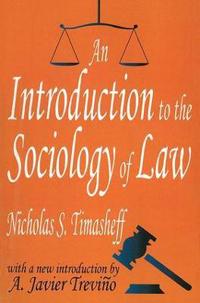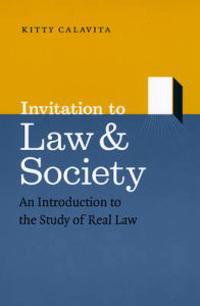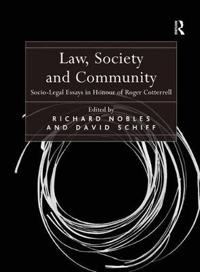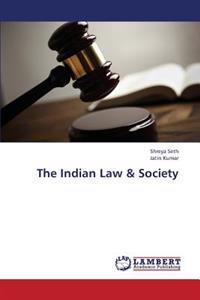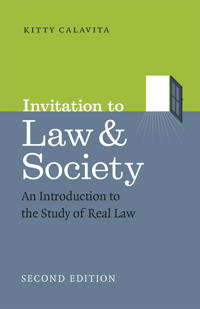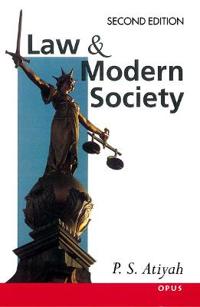From Popular Sovereignty to the Sovereignty of Law: Law, Society and Politics in Fifth Century Athens (Övrig)
avMartin Ostwald
ISBN: 9780520067981 - UTGIVEN: 1989-12-21Analyzing the 'democratic' features and institutions of the Athenian democracy in the fifth century B.C., Martin Ostwald traces their development from Solon's judicial reforms to the flowering of popular sovereignty, when the people assumed the right both to enact all legislation and to hold magistr[...]
An Introduction to the Sociology of Law (Häftad)
avLaw and Society Series
ISBN: 9780765807298 - UTGIVEN: 200107Invitation to Law & Society
ISBN: 9780226089973 - UTGIVEN: 2010-05Law and society is a rapidly growing interdisciplinary field that turns on its head the conventional, idealized view of the 'law' as a magisterial abstraction. Kitty Calavita's "Invitation to Law and Society" brilliantly brings to life the ways in which law shapes and manifests itself in the institu[...]
Copyright Law Symposium: No. 38 (Övrig)
avAuthors And Publishers American Society Of Composers
ISBN: 9780231076067 - UTGIVEN: 1992-04-22Copyright Law Symposium: No. 39 (Inbunden)
avAuthors And Publishers American Society Of Composers
ISBN: 9780231076081 - UTGIVEN: 1992-05-20ASCAP Copyright Law Symposium: No. 40 & 41 (Inbunden)
avAuthors And Publishers American Society Of Composers
ISBN: 9780231110600 - UTGIVEN: 1997-02-15Assessment of Mental Capacity: Guidance for Doctors and Lawyers, 2nd Editio (Övrig)
avBritish Medical Association, Law Society
ISBN: 9780470757345 - UTGIVEN: 2008-01-31Law/Society (Pocket)
avJohn Sutton
ISBN: 9780761987055 - UTGIVEN: 2000-12Foundations of the Sociology of Law provides a conceptual framework for thinking about the full range of topics within the sociology of law discipline. The book: contrasts normative and sociological perspectives on law; presents a primer on the logic of research and inference as applied to law relat[...]
Law, Society, and History (Häftad)
ISBN: 9781107459496 - UTGIVEN: 2014-10This book assembles essays on legal sociology and legal history by an international group of distinguished scholars. All of them have been influenced by the eminent and prolific legal historian, legal sociologist and scholar of comparative law, Lawrence M. Friedman. Not just a Festschrift of essays [...]
Law, Society and Community
ISBN: 9781472409829 - UTGIVEN: 2014-09This collection of socio-legal studies, written by leading theorists and researchers from around the world, offers original, perceptive and critical contributions to ideas and theories that have been expounded by Roger Cotterrell over a long and distinguished career. Engaging with many classic issue[...]
Law, Society and Transition in Myanmar
ISBN: 9781509912964 - UTGIVEN: 2017-01This edited volume addresses the dynamics of the legal system of Myanmar/Burma in the context of the dramatic but incomplete transition to democracy that formally began in 2011. It includes contributions from leading scholars in the field on a range of key legal issues now facing Myanmar, such as ju[...]
Rethinking Law Society and Governance (Häftad)
ISBN: 9781841132945 - UTGIVEN: 2001-11This set of essays engages with some aspects of Foucault's notion of governmentality,particularly at the junction where law/regulation meets 'the social'. 'The social', as a special sphere of government, is a special area of concern for those working within broad intellectual spaces of the 'governm[...]
Law, Society and Transition in Myanmar (Inbunden)
avMelissa (EDT) Crouch, Tim (EDT) Lindsey, Melissa (EDT) Crouch
ISBN: 9781849465977 - UTGIVEN: 2014-09This edited volume addresses the dynamics of the legal system of Myanmar/Burma in the context of the dramatic but incomplete transition to democracy that formally began in 2011. It includes contributions from leading scholars in the field on a range of key legal issues now facing Myanmar, such as ju[...]
Assessment Of Mental Capacity (Pocket)
avThe Law Society, British Medical Association
ISBN: 9781853287787 - UTGIVEN: 2009-12-20Information Technology Law: The Law And Society (Pocket)
avAndrew Murray
ISBN: 9780199661510 - UTGIVEN: 2013-08-29Information Technology Law examines how the law interacts with our actions in cyberspace and other elements of the information society. The first textbook to consider the relationship between the legal system and the information society, it also covers issues such as governance, free expression, cri[...]
Invitation to Law and Society, Second Edition: An Introduction to the Study of Real Law (häftad)
ISBN: 9780226296586 - UTGIVEN: 2016-04Law and society is a rapidly growing field that turns the conventional view of law as mythical abstraction on its head. Kitty Calavita brilliantly brings to life the ways in which law is found not only in statutes and courtrooms but in our institutions and interactions, while inviting readers into c[...]
Power and Law in International Society: International Relations as the Sociology of International Law
ISBN: 9781138804609 - UTGIVEN: 2015-04When studying international law there is often a risk of focusing entirely on the content of international rules (i.e. regimes), and ignoring why these regimes exist and to what extent the rules affect state behavior. Similarly, international relations studies can focus so much on theories based on [...]
Law Business And Society (Inbunden)
avTony Mcadams
ISBN: 9780073525006 - UTGIVEN: 2012-01-01Takes an interdisciplinary approach, utilizing elements of law, political economy, international business, ethics, social responsibility and management. This title helps students learn not merely the law but the law in context.[...]
Law and Modern Society (Storpocket)
avP. S. Atiyah
ISBN: 9780192892676 - UTGIVEN: 1995-09The law in a modern society is an extremely bulky and complex instrument, with a distracting tendency to become less fixed, less rule-oriented, and more discretionary. An institution made by men for the government of men, the law today can all too readily confuse and dismay us. How and why is so mu[...]
Empowered Self, The: Law and Society in the Age of Individualism (Inbunden)
avThomas M. Franck
ISBN: 9780198298410 - UTGIVEN: 2000-02-24A General Jurisprudence of Law and Society (Häftad)
avBrian Z. Tamanaha
ISBN: 9780199244676 - UTGIVEN: 2001-07An exploration of the relationship between law and society. Generally understood to be a mirror of society, a reflection of its customs and morals, the law maintains social order. Focusing on this common understanding, the book conducts a survey of social and legal theories.[...]
Empowered Self, The: Law and Society in the Age of Individualism (Pocket)
avThomas M. Franck
ISBN: 9780199248094 - UTGIVEN: 2001-04-19


